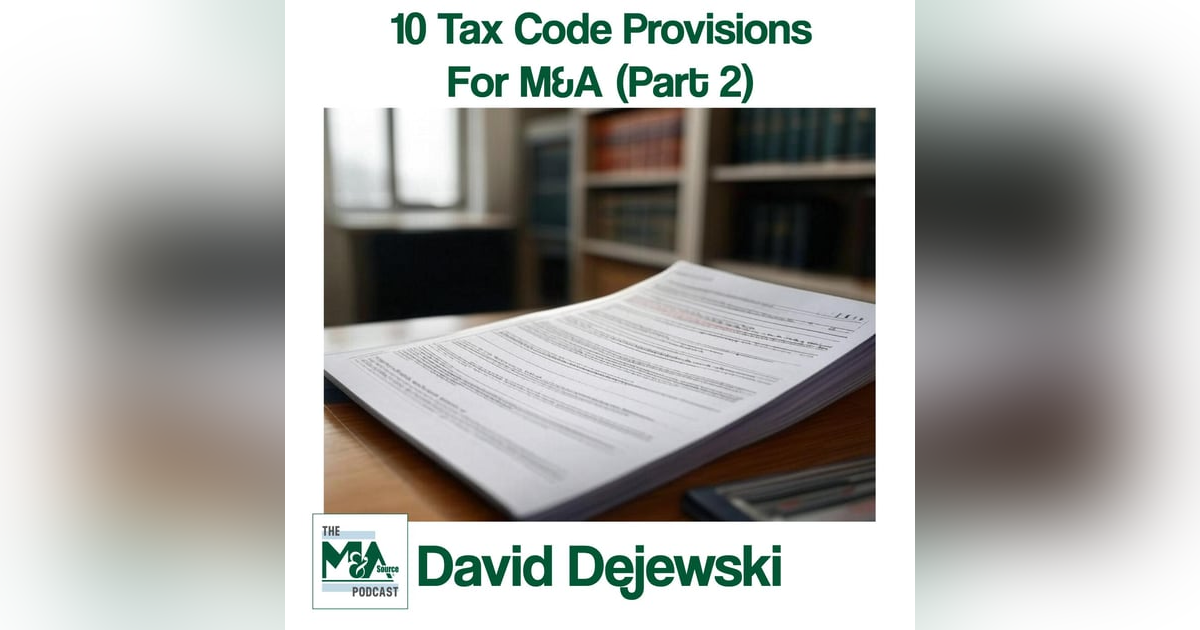Top 10 Tax Code Provisions to Leverage in M&A (Part 2)


Interact with the show: https://snip.ly/mas_interact25
In this episode of the M&A Source podcast, Dave Dejewski continues a series on essential tax code provisions for mergers and acquisitions, discussing five additional provisions that can significantly impact tax outcomes for buyers, sellers, and their advisors.
Topic Discussed
The exchange is a podcast discussing 10 tax code provisions that are relevant for mergers and acquisitions (M&A) transactions. It is divided into two parts, with Part 1 covering the first 5 provisions and Part 2 covering the remaining 5 provisions.
Part 2 covers the following tax code provisions:
1. Section 368 - Tax-Free Reorganizations
This provision allows for tax-deferred treatment of certain corporate reorganizations, such as mergers and acquisitions, to encourage business continuity, growth, and realignment without triggering immediate tax liabilities. It requires continuity of interest and continuity of business enterprise.
2. Section 409A - Deferred Compensation
This provision establishes strict rules for when income can be deferred and when it must be paid, preventing abuse and ensuring fairness in the tax system. It imposes penalties for non-compliance and encourages proper planning and transparency in deferred compensation plans.
3. Section 1031 - Like-Kind Exchanges
This provision allows for the deferral of capital gains taxes when exchanging real properties for similar properties, stimulating growth in real estate-heavy businesses.
4. Section 721 - Contributions to Partnerships
This provision promotes the creation and growth of partnerships by allowing individuals or entities to contribute property to a partnership without triggering immediate tax consequences, facilitating partnership formation and encouraging joint ventures and investments.
5. Section 453 and 453A - Installment Sales
Section 453 allows sellers to report capital gains income over time through the installment sale method, aligning tax payments with the receipt of sale proceeds and providing tax deferral. Section 453A imposes an interest charge on large installment sales over $5 million to limit the tax benefits of deferring large amounts of tax.
Key Takeaways
These final five of ten tax provisions cover a wide range of areas, including tax-free reorganizations, deferred compensation, like-kind exchanges, partnership contributions, and installment sales.
The episode highlights the importance of understanding these provisions and leveraging them to minimize tax liabilities, encourage business continuity, and facilitate growth and realignment. It also emphasizes the need for proper planning, transparency, and compliance to avoid penalties and ensure that the intended tax benefits are realized.
Overall, this episode provides valuable insights into the tax considerations and strategies that should be taken into account when structuring M&A deals, making it a valuable resource for advisors, business owners, and investors involved in such transactions.
LEGAL DISCLAIMER: This resource is intended for educational purposes only and does not constitute legal, financial, or tax advice. The information provided herein should not be relied upon for any specific business or financial decision without first consulting appropriate professional counsel. Readers are encouraged to seek advice from qualified attorneys, accountants, or other professionals to address their unique circumstances. Neither the authors nor the publisher assumes any responsibility for actions taken based on the information provided in this resource.
The learn more about M&A Source, please visit us at https://MASource.org

Managing Director / Host of the M&A Source Podcast
David Dejewski is the host of the M&A Source Podcast and a business leader with a diverse background in media, communications, and strategic leadership, including significant contributions to the U.S. Department of Defense. David’s media journey began in 1994 when he produced Images and Words, the Other Side of D.U.I., a 22-minute film aimed at educating young people about the dangers of drinking and driving. Supported by organizations like the US Navy and the College of Charleston, the project exemplified his early commitment to impactful communication.
David has since produced three successful podcast programs, the first of which launched in 2005 to address military healthcare leaders globally while serving as the Chief for Defense Business Transformation in the Military Healthcare System. During his tenure, he led efforts to establish a business transformation process that reviewed over $1 billion in investments, sending $200 million back to the Treasury due to redundancies or inefficiencies. David’s role was critical in aligning business IT investments with enterprise architecture, ensuring compliance, and delivering results that saved taxpayer dollars. His second podcast expanded his reach to a global audience as chair of a 501(c)(3) organization, where the show still receives hundreds of monthly downloads.
In his current role as Managing Director at Transworld Business Advisors, David specializes in problem-solving, business sales, M&A, and franchising for small and mid-market companies. His leadership extends to the M&A Source, where h…Read More








